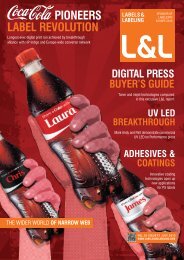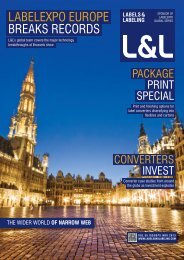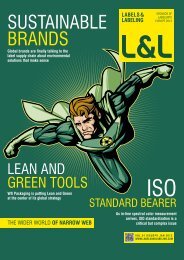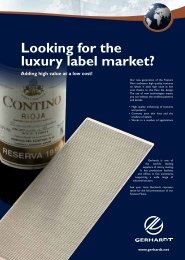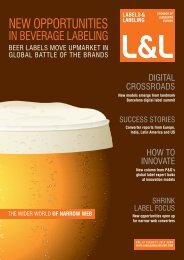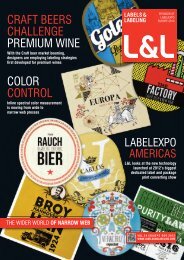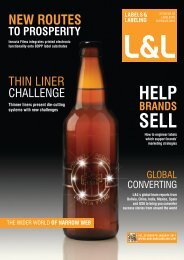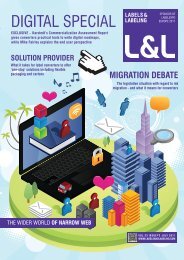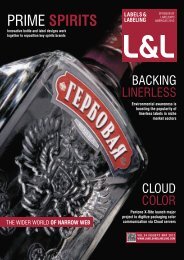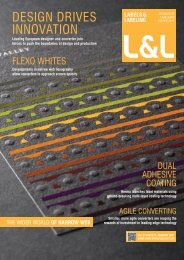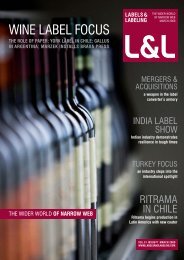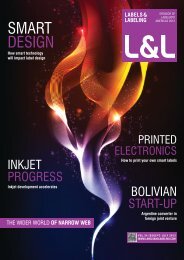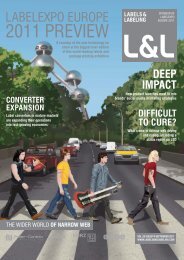THE DATA FRONT
Download as PDF - Labels & Labeling
Download as PDF - Labels & Labeling
- No tags were found...
Create successful ePaper yourself
Turn your PDF publications into a flip-book with our unique Google optimized e-Paper software.
Labels&Labeling |89<br />
Paper choice<br />
An in-depth survey of consumer attitudes towards bottle labels claims to have revealed a clear preference<br />
for well-designed paper materials. Andy Thomas reports<br />
The importance of bottle labels to customers has apparently been<br />
underestimated, according to a recent, in-depth marketing survey carried<br />
out for Brigl & Bergmeister, a leading manufacturer of label and packaging<br />
paper. On the basis of 100 in-depth interviews, the Bremen-based market<br />
research company nextpractice claims to have demonstrated that bottle labels<br />
are exceptionally important to the buying decisions of customers. The study<br />
concludes that label design and material are not a minor issue but a central tool<br />
in strategic brand management.<br />
The report’s background is the rise of global integration, which has<br />
dramatically increased complexity and speed of change for all protagonists in<br />
the market. Fierce competitive pressure has forced producers to optimise their<br />
processes continually and to utilise all conceivable economies of scale. In the<br />
fight for the cheapest prices, the distributive trade has expanded its position<br />
decisively, with the share of brands steadily increasing.<br />
‘From the customer’s perspective, this trend has resulted in a proliferating<br />
range of goods which is increasingly diminishing the scope for differentiation.<br />
Given an overload of information which is increasingly difficult to process,<br />
people are longing for differences which make a real difference. In their<br />
overtaxing everyday lives customers seek guidance at the point of sale and<br />
the point of use.’<br />
The contribution from conventional advertising ‘seems exhausted in a world<br />
whose media whizz has long since left behind people’s processing capacity.<br />
Buying decisions are becoming increasingly spontaneous and emotional. As<br />
brain research strikingly shows, the processing of unconscious impressions has<br />
a much greater bearing on actions than our own experiences would suggest.’<br />
The more unclear the world becomes, the greater the importance of intuitive<br />
decision-making criteria. ‘From the perspective of branding, the moment at<br />
which the customer grabs the product moves to the center of attention.’<br />
When the Bremen-based market research company nextpractice completed<br />
its research into the psychological effect of bottle labels, the results were<br />
clear cut:<br />
‘The results surprised us in terms of their clarity,’ noted Professor Peter Kruse,<br />
brain researcher and scientific director of the study. Summing up its findings,<br />
Professor Kruse noted: ‘In the study we used an interview technique which<br />
makes it possible also to identify a person’s unconscious attitudes. This showed<br />
that the emotional impact of bottle labels is exceptionally high. Compared with<br />
other consumer areas, customers react to the design and material of bottle<br />
labels extremely sensitively and with a broad range of feelings. We had not<br />
expected that to be the case.’<br />
In the study a large number of bottles currently on the market were made<br />
available to the consumers surveyed. The materials and the beverage brands<br />
were balanced out in such a way that the reactions measured could be clearly<br />
related to the differences in label design and material.<br />
The study concluded that consumers preferred paper labels to plastic labels<br />
irrespective of the bottle material. In a direct comparison, the paper labels were<br />
virtually always preferred. ‘Paper is perceived as being of higher quality and<br />
more reputable,’ says the report. ‘The customers associated quality, festiveness<br />
and reward with the paper label. Beer, water and fruit juices are very strongly<br />
associated with paper labels.’ The report claims a ‘relatively better ecological<br />
balance of paper compared with plastic plays a not insignificant and evidently<br />
increasingly important role in this regard. The use of natural materials is of high<br />
importance to people, especially as far as packaging for foods, beverages and<br />
tobacco is concerned.’<br />
Notwithstanding the preference for paper, the report says consumers do not<br />
forgive a label design which is below standard. ‘Regardless of paper or plastic,<br />
a supplier which fails to use the bottle label as a calling card for their brand runs<br />
the risk of collecting significant penalty points.<br />
If the paper label is reduced to the conventional<br />
square form or the plastic label simply covers the<br />
bottle like a second skin, a great opportunity to<br />
raise the brand’s profile has been squandered. An<br />
especially important enthusiasm factor with the<br />
design of a label, alongside harmonious coloring<br />
and clear lines, is evidently the shape. All the<br />
consumers who took part in the study intuitively<br />
stressed the multi-section and unusual design<br />
of labels as an especially positive distinguishing<br />
criterion.’<br />
Professor Peter Kruse is Honorary Professor<br />
of General and Organizational Psychology at the<br />
University of Bremen and is a sought-after expert<br />
in corporate culture and emotional branding<br />
On the study<br />
In the summer of 2008, nextpractice surveyed 100<br />
final consumers in in-depth interviews lasting several<br />
hours on their perception and assessment of bottle<br />
labels in the context of buying behaviour and consumer<br />
habits. The study focused on the emotional effect of<br />
paper labels compared with plastic labels. An ITassisted<br />
psychological interview technique known as<br />
‘nextexpertizer’ was used, claimed to make it possible to<br />
detect and compare people’s unconscious preferences.<br />
The Bremen-based consultancy and methodology<br />
company nextpractice was founded in 2001 by the<br />
brain researcher Professor Peter Kruse. Alongside<br />
market research and trend analysis, nextpractice is<br />
engaged in management consulting. Peter Kruse is<br />
Honorary Professor of General and Organisational<br />
Psychology at the University of Bremen and a soughtafter<br />
expert in corporate culture and emotional branding<br />
both nationally and internationally. Together with the<br />
nextpractice company, he has received several awards<br />
for the development of innovative analysis methods and<br />
management tools.<br />
The study was commissioned by Brigl & Bergmeister<br />
GmbH, which claims that one hundred billion labels a<br />
year are printed on its special papers.<br />
may 2009 | L&L



